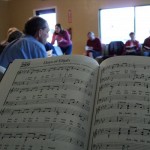Come now, let us reason together…
No, this post is not about Isaiah (from Isaiah 1:18). Instead, it is about the early church as described by Luke in the book of Acts.
But, you may be wondering, what does “reasoning together” have to do with the early church? Not only is this related to the early church, but the phrase “reasoning together” is used by Luke to describe what happened when the church gathered together.
Here’s the passage that I’m talking about:
And he [Paul] entered the synagogue and for three months spoke boldly, reasoning and persuading them about the kingdom of God. But when some became stubborn and continued in unbelief, speaking evil of the Way before the congregation, he withdrew from them and took the disciples with him, reasoning daily in the hall of Tyrannus. This continued for two years, so that all the residents of Asia heard the word of the Lord, both Jews and Greeks. (Acts 19:8-10 ESV)
If you would allow me, I’d like to retell this story in my own words. It begins with Paul coming back to Ephesus. He had visited the city briefly, and had returned. As was his custom, his began by going to the synagogue where he often found people who were interested in hearing about God’s kingdom and the gospel of Jesus Christ.
Luke says he continued gathering with the synagogue for three months. Now, he may have only met with them weekly on the Sabbath, but many texts from that time period indicate that Hellenistic Jews gathered as the synagogue more often than weekly. Regardless, while Paul was gathered with them, he had opportunities to proclaim the gospel of Jesus Christ. Some believed and began to walk in “the Way” (one of the earliest names given for following Jesus Christ, i.e., Christianity). However, others became more stubborn and contentious and even began to “speak evil” of the new manner of life in Jesus Christ that Paul was proclaiming.
So, Paul and the disciples stopped gathering with the synagogue and began gathering in “the hall of Tyrannus.” For two years, followers of Jesus Christ in the city of Ephesus gathered daily at that hall (perhaps a school?). (I’m not assuming that the same group of believers gathered every day. I’m assuming that at least some of the believers were there at some point every day.)
What did the disciples of Jesus Christ do when they gathered at the hall of Tyrannus? They were “reasoning.” What does this mean? While the word “reasoning” is a translation of the Greek verb διαλέγομαι (dialegomai). This is the verb that eventually becomes the English verb “dialog.” But, we can’t assume that’s what διαλέγομαι (dialegomai) means – that would be a logical fallacy.
Instead, let’s look at a few other places where διαλέγομαι (dialegomai) is used in Scripture:
But they kept silent, for on the way they had argued (διαλέγομαι – dialegomai) with one another about who was the greatest. (Mark 9:34 ESV)
But when the archangel Michael, contending with the devil, was disputing (διαλέγομαι – dialegomai) about the body of Moses, he did not presume to pronounce a blasphemous judgment, but said, “The Lord rebuke you.” (Jude 1:9 ESV)
We can see that this verb is used to indicate some type of discussion (at least in the instances above). It definitely did not indicate one person speaking.
We also find this verb used to describe what Paul did when he gathered with other Jews among the synagogue:
And Paul went in, as was his custom, and on three Sabbath days he reasoned (διαλέγομαι – dialegomai) with them from the Scriptures… (Acts 17:2 ESV)
So he reasoned (διαλέγομαι – dialegomai) in the synagogue with the Jews and the devout persons, and in the marketplace every day with those who happened to be there. (Acts 17:17 ESV)
This makes sense also, since we know that many of the Jews often disagreed with him. We can assume that Paul would not have been allowed to make a prolonged speech concerning the gospel without some response from those who disagreed.
In fact, Luke used the same verb to describe what Paul did in the synagogue in Ephesus, both the first time he visited the city and also in the passage quote above just before he and the disciples left the synagogue:
And they came to Ephesus, and he left them there, but he himself went into the synagogue and reasoned (διαλέγομαι – dialegomai) with the Jews. (Acts 18:19 ESV)
And he entered the synagogue and for three months spoke boldly, reasoning and persuading (διαλέγομαι – dialegomai) them about the kingdom of God. (Acts 19:8 ESV)
We also find this same other verb later in Acts when Paul spent some time with the church in Troas:
On the first day of the week, when we were gathered together to break bread, Paul talked (διαλέγομαι – dialegomai) with them, intending to depart on the next day, and he prolonged his speech until midnight. There were many lamps in the upper room where we were gathered. And a young man named Eutychus, sitting at the window, sank into a deep sleep as Paul talked (διαλέγομαι – dialegomai) still longer. And being overcome by sleep, he fell down from the third story and was taken up dead. (Acts 20:7-9 ESV)
So, for Luke especially, one of the favorite verbs to describe what happened when the church gathered is a verb that points to some type of discussion… so much so that it can even be used to describe a dispute or argument.
We need to hear each other’s stories
Mutual edification is more than just another option or a good idea. It is necessary for the church grow in maturity.
What do I mean by mutual edification? “Mutual” refers to each part of the church working together to impact every other part of the church. It doesn’t mean that everyone speaks, but it does mean that everyone has the opportunity to speak. “Edification” refers to our purpose in speaking together and/or serving together, which is to help one another grow (“edification” = “build up”) in maturity in Jesus Christ, which includes knowing Jesus and being united with one another.
This is exactly what Dan (from “Cerulean Sanctum“) is talking about in his post “Why I Didn’t Go to Church on Sunday.”
In the post, Dan explains why he didn’t gather with the church last Sunday. While he pointed out the specific topic of the sermon that day in the beginning of the post, by the end of the post he gets to the real problem: a lack of mutual edification. Dan writes:
Your story of Jesus has value to me. Not just the pastor’s story, but yours. Mine has value to you too. Wouldn’t it be great if we could hear those stories? Wouldn’t it be wonderful to see your story and mine fit within that greater Story?
Yes, I think they would be so excellent to hear. Now if only we could find some time in church on Sunday to squeeze them in.
You see, it has been decided by “the powers that be” that “mutual edification” is not as important or as expedient as one person given a great speech (sermon). (Many times – perhaps most often – this decision has already been made by tradition that is rarely, if ever, questioned.) That’s not a decision that can be supported by Scripture – unless, of course, you take certain passages out of context and completely leave out huge chunks of Scripture.
I sympathize with Dan and many, many others like him who have decided it’s just not beneficial to “attend church” anymore, And, in many cases, they’re probably right. It would probably be much more beneficial for them as followers of Jesus Christ for them to share lunch and their stories with a few brothers and sisters in Christ.
Oh, trust me, if people started doing that they would miss the great singing and the well-crafted and -studied sermons. But, they would get much, much more out of their time spent together.
But what do you do when you get together with the church?
Last week, I had a great conversation with a brother in Christ on Facebook. That conversation reminded me of another conversation.
A young man started gathering with us on Sunday mornings a few years ago. Soon, he completely understood what we were all about, and he was sharing his life with other people among the church. He began serving people with the many gifts and talents that God had given him. In spite of being part of churches (even famous churches) for many years, he loved and thrived in an environment of mutual edification and discipleship.
He began to explain our understanding of church to his friends. He would explain about sharing our lives with one another – spending time with one another throughout the week – hanging out with each other at coffee shops – going to dinner with one another – helping each other with service projects – and on and on.
Eventually, (he told me) his friends would always come to the same question: “Yes, but what do you do when you get together with the church on Sunday morning?”
He would tell them that we often pray together, sing together, study Scripture together, eat together. They would tell him that they do the same things with the church on Sunday mornings (except eat together). He would try to explain that he’s not talking about the things we do when we gather together; he’s talking about a shared life in Jesus Christ, with a planned gathering as only one aspect of that life.
But, as much as he would try to explain it to them, they would always return to this: “But, we do the same things when we gather with the church.”
See, the thing is, my friend had learned that church is not about the things you do when you get together with other believers. Instead, the fellowship and shared lives is more important than any particular activity. Oh, there will be certain activities. You will want to pray for one another, and you will want to sing along when God has placed a song on someone’s heart, and you will want to understand Scripture, and you will want to eat together…
However, the activities are not the point. In fact, the activities should flow out of our shared lives together. The activities are not a beginning or an end in themselves.
But, until someone understand the importance of fellowship in Jesus Christ – actually sharing lives with one another, not just attending a meeting together – then the activities have to take central stage. (And, thus, we have fights and wars over exactly how to do those activities…)
When fellowship in Jesus Christ becomes central – because Jesus Christ is central – then the activities (and exactly how to do the activities) become less important.
So, “what do we do when we get together with the church?” We share our lives with one another… “No, I mean, what do you DO? What activities?” Whatever is necessary to help one another grow in Jesus Christ.
Pervasive Mutuality – 1 Peter 4:7-11
Whenever I talk about mutuality, I tend to focus on a few passages, such as Ephesians 4:7-16 or 1 Corinthians 14:26-40. However, mutuality (the one-another’ing aspect of our lives together in Christ) is actually very pervasive (widespread) in Scripture.
One of those mutuality passages is 1 Peter 4:7-11. In his first letter, Peter writes about suffering while living in Christ. In chapter 4, Peter talks about those who are choose to live their own way and are surprised with God’s people refuse to go along with it.
According to Peter, what should our response be when we are maligned because we refuse to live according to immoral cultural norms? He writes:
The end of all things is at hand; therefore be self-controlled and sober-minded for the sake of your prayers. Above all, keep loving one another earnestly, since love covers a multitude of sins. Show hospitality to one another without grumbling. As each has received a gift, use it to serve one another, as good stewards of God’s varied grace: whoever speaks, as one who speaks oracles of God; whoever serves, as one who serves by the strength that God supplies—in order that in everything God may be glorified through Jesus Christ. To him belong glory and dominion forever and ever. Amen. (1 Peter 4:7-11 ESV)
So, what is Peter’s answer to living in a society filled with “living in sensuality, passions, drunkenness, orgies, drinking parties, and lawless idolatry”? (1 Peter 4:3 ESV) His answer is self-control, sober-mindedness, love, hospitality, and service. While the first couple of things (self-control and sober-mindedness) can be personal, the last three are very practices of mutuality: love, hospitality, and service.
In this passage, Peter stresses love, because, as he says, “love covers a multitude of sins.” It’s clear that he’s talking about sins among and between brothers and sisters in Christ, since he introduced this with “keep loving one another earnestly.” In other words, even when someone sins against you or sins against your sister/brother, keep on loving that person earnestly – really – truly – in deed, not just in words. (By the way, I find it both interesting and important that almost every “mutuality” passage in Scripture includes a focus on love.)
Next he encourages his readers to open their homes to one another and practice hospitality “without grumbling.” While hospitality is always an important way for us to demonstrate our love and support to our brothers and sisters in Christ, it becomes even more important when Christians are being persecuted. When we open our homes, we share our lives, and this is extremely important to our maturity in Christ.
Finally, Peter concludes this mutuality passage with a focus on spiritual gifts. Believe it or not, this is my favorite scriptural passage on spiritual gifts. Peter reminds us that these gives are given to us for the sake of others – to serve them -not for our own sake. I love how Peter boils down all spiritual gifts into two categories: speaking and serving. And, whenever we do those things, we do them from God, not from ourselves.
Once again we see that mutuality among the body of Christ is extremely important and is found throughout the writings of Scripture.
Pervasive Mutuality – Jude 20-23
Whenever I talk about mutuality, I tend to focus on a few passages, such as Ephesians 4:7-16 or 1 Corinthians 14:26-40. However, mutuality (the one-another’ing aspect of our lives together in Christ) is actually very pervasive (widespread) in Scripture.
One of those mutuality passages is Jude 20-23. Most people know that Jude writes about false teachers that had attached themselves to the church. He tells his readers that God would judge these false teachers just as he had judged others in history. But, what was the church supposed to do about these false teachers?
These are the only instructions that Jude gives directly to the believers reading his letter:
But you, beloved, building yourselves up in your most holy faith and praying in the Holy Spirit, keep yourselves in the love of God, waiting for the mercy of our Lord Jesus Christ that leads to eternal life. And have mercy on those who doubt; save others by snatching them out of the fire; to others show mercy with fear, hating even the garment stained by the flesh. (Jude 20-23 ESV)
Interestingly, Jude never tells his readers to confront the false teachers. He never tells them to correct them. That doesn’t mean that confrontation or correction is wrong. Instead, it shows that neither confrontation nor correction was the focus for Jude.
What was his focus? His focus was on the continued growth of the believers who were reading his letter. And, he knew that growth would only happen if they worked together to help each other grow in maturity – even in face of false teaching. Why? Because shared life and shared service and shared discipleship is stronger than any false teacher.
How were the believers supposed to respond to false teachers? By continuing to keep themselves in the love of God by building up (edifying) each other and praying. In other words, Jude’s response to false teachers is mutuality – the whole church working together to help each other mature in Jesus Christ. In fact, instead of telling his readers to respond or react to the false teachers, he tells them to “[wait] for the mercy of our Lord Jesus Christ.”
And, what should the church do about those who follow these false teachers? Again, mutuality is the answer. They are to show mercy to those who need it and rescue those who will accept their help.
Perhaps most interesting to me is the fact that, in the face of false teaching, Jude does not tell his readers to keep themselves in the “truth of God.” He tells them to keep themselves in the love of God. Obviously, there is some correlation between God’s truth and God’s love, but it’s intriguing that Jude focuses on God’s love as a response to false teaching.
And, again, it’s not each person keeping himself or herself in the love of God. Jude envisions the church working together to help each other reamin in the love of God. Once again, a beautiful picture of mutuality where we might not expect it.
Pervasive Mutuality – Hebrews 12:12-17
Whenever I talk about mutuality, I tend to focus on a few passages, such as Ephesians 4:7-16 or 1 Corinthians 14:26-40. However, mutuality (the one-another’ing aspect of our lives together in Christ) is actually very pervasive (widespread) in Scripture.
One of those mutuality passages is Hebrews 12:12-17. This passage follows the very famous passage at the beginning of Hebrews 12 in which the author exhorts his readers to set aside distractions and sin and to “look to Jesus.” Next, the readers are encouraged to trust God and his love for them in spite of any “discipline” they may be facing.
After that section on discipling (“For the Lord disciplines the one he loves”), the author writes:
Therefore lift your drooping hands and strengthen your weak knees, and make straight paths for your feet, so that what is lame may not be put out of joint but rather be healed. Strive for peace with everyone, and for the holiness without which no one will see the Lord. See to it that no one fails to obtain the grace of God; that no “root of bitterness” springs up and causes trouble, and by it many become defiled; that no one is sexually immoral or unholy like Esau, who sold his birthright for a single meal. For you know that afterward, when he desired to inherit the blessing, he was rejected, for he found no chance to repent, though he sought it with tears. (Hebrews 12:12-17 ESV)
From first glimpse, it appears that the author is exhorting each reader to lift up his own drooping hands or strengthen her own weak knees. It seems that each reader is instructed to make straight paths for each one’s own feet. However, as we keep reading, we realize that these commands are much more mutual than that, especially when we get to verse 15.
Although verse 15 in the translation above begins with a command, it is actually in the form of a participle: See[ing] to it that no on fails to obtain the grace of God. And, to make this an even stronger statement, the verb translated “See to it” is the same verb that is normally translated “oversee.” (It’s actually the same form of the verb found in 1 Peter 5:2 when Peter is addressing “elders.”)
Thus, the author is exhorting his readers to “oversee” each other to ensure that no one fails to live in the grace of God, that no “root of bitterness” grows in anyone’s heart, and that no one falls into sexual immorality. As you can tell, these are issues of spiritual oversight, and we are all responsible for “overseeing” each other.
From this passage especially, we can see that the meaning of the verb “oversee” is very close to the meaning of the verb “consider” in this passage (which is another of my favorite when it comes to mutuality):
And let us consider how to stir up one another to love and good works… (Hebrews 10:24 ESV)
Yes, it is all of our responsibilities to look into one another’s lives, to help each other follow Jesus Christ, and to help one another grow in maturity together. This is what mutuality among the church is all about.
Pervasive Mutuality – 1 Thessalonians 5:11-14
When I talk about or write about mutuality among the church, I tend to focus on a few passages, such as Ephesians 4:7-16 or 1 Corinthians 14:26-40. However, mutuality is much more pervasive in Scripture than these or other popular passages.
For example, there is an awesome passage in 1 Thessalonians that paints a beautiful picture of mutuality among the church while combining the work of mature believers (leaders) and the work of all believers as they help each other grow in Jesus Christ together.
Here is the passage:
Therefore encourage one another and build one another up, just as you are doing. We ask you, brothers, to respect those who labor among you and are over you in the Lord and admonish you, and to esteem them very highly in love because of their work. Be at peace among yourselves. And we urge you, brothers, admonish the idle, encourage the fainthearted, help the weak, be patient with them all. (1 Thessalonians 5:11-14 ESV)
Now, before I get started, I need to say that there is one part of the translation above that I think is problematic. It’s the participle translated “[who] are over you.” Given the broader teachings in Scripture and the range of meanings of this verb, I think it’s much better translated as “[who] care for you.”
The passage begins with a general exhortation to “encourage one another and build up one another” (1 Thessalonians 5:11) and the praise that they (the Thessalonians) are already doing that. It’s important that this instruction about encouragement and edification follows the statement, “For God has not destined us for wrath, but to obtain salvation through our Lord Jesus Christ, who died for us so that whether we are awake or asleep we might live with him.” (1 Thessalonians 5:9-10 ESV) Thus, for those of us who are still “awake,” we encourage and build up one another to continue to “live with him.”
Next, Paul follows this general exhortation toward encouragement and edification with 1) a recognition that some are more mature and capable in their ability to encourage and edify and 2) an exhortation for all to do the work of encouragement and exhortation.
First, Paul says that we should highly respect those who are actually working hard among the church, who are caring for others, and how are teaching and admonishing each other. (1 Thessalonians 5:12-13) (By the way, notice how this passage is parallel to 1 Timothy 5:17, which may help us understand what Paul means by “double honor” in his letter to Timothy.) Paul has also offered himself and his apostolic co-workers as examples of what it means to “work hard” among the church and care for others. (1 Thessalonians 2:5-12) I do not think Paul is intending to point out certain offices, positions, or titles here. He could have easily said “elders” or “overseers.” Instead, he points to those who are actually doing the work among the church what all should be doing, whether they have been recognized (as elders) for that example or not.
Next, Paul does not stop at the work of these leaders. He continues to exhort all the brothers and sisters to encourage and edify one another using very similar language that he used when referring to the leaders previously. (1 Thessalonians 5:14) Putting these last three verses together, we see that Paul expects all believers to encourage, admonish, help, and show patience (among other things), while offering respect to those who are actually doing these things consistently.
Again, this is not a very popular passage when it comes to mutuality. It’s not one of the passages that are often quoted to encourage the church toward one another’ing. But, it’s a very important passage because it shows how leaders and the whole church work together for the encouragement and edification of all.
Ch-ch-ch-ch-changes… and the church
No, I’m not writing this post about changes on this blog or even about changes in my own life. Our family has been through several changes over the last year or so, but I’ve already written about those.
This post is about changes and the church.
Over the last few years, I’ve come to expect two things when it comes to change and the church: 1) Change should be expected and constant, and 2) Change is not comfortable.
The church is people – God’s people gathered together. Since we are God’s people who are indwelled by the Holy Spirit and following Jesus Christ, we are in a constant state of change. We are growing in maturity (hopefully); our life situations are changing; God is continually working in and through us.
Put us together, and there is even more change. And, this doesn’t even count the people who are moving away, or new people who start gathering with us.
If we are truly interacting with one another when we gather with the church, then that interaction will change as well. Our relationships are changing, our struggles are changing, and our manner of following Jesus is changing. All of this adds up to even more change.
But, do we see this change reflected among the church, especially when we gather together? Oh, we may tweak something here or there, but, for the most part, it’s all the same week after week, month after month, year after year.
All of this indicates that the way we are meeting (generally among the church) does not actually reflect the people at all.
However, most people are fine with that. Why? Because change is uncomfortable. We want things to stay the same, especially when things are actually changing. The apparent lack of change makes us think that everything is fine. We want the distraction from real life.
But, that’s just it… it’s not real life.
And, if it’s not real life, then we’re not helping each other with real life. Putting on something that’s stable and unchanging (even if it’s “excellent”) is not beneficial to the growth and health of the church.
Yes, change is uncomfortable. But, our goal should never be to help people remain comfortable where they are. Our goal should always be to help one another understand where we are and where God is taking us (both as individuals and as a group). This is only possible if we embrace that change that we are all going through, and allow that change to be reflected as we gather together.
Of course, that can only happen if the people (all of us – one another) truly participate with one another as we gather together.
Mutual edification brings out the Christ in one another
I’ve been studying mutual edification for several years now. My friends and I have sought to build up (edify) one another whenever we’re together. A few days ago, I saw a description of “mutual edification” that perfectly explains what it’s all about.
That description came from Nathan at “Joined to Him” in his post “A Study on Mutual Edification – Part 2.”
In his post, he comments on Hebrews 10:24-25 (one of my own favorite passages in Scripture referring to mutual edification). At one point, Nathan writes this about the 2nd half of Hebrews 10:24:
The second part of the verse reveals that we need to consider our brothers and sisters in a way that will allow us to stir them up towards love and good works. This shows us some of the purposes behind mutual edification. We mutually edify one another so that we may all grow in love and good deeds. Love and good works were a signature of the life and ministry of Christ. So mutual edification brings out the Christ in one another.
When you think about it, this makes perfect sense. Of course, the Holy Spirit (the Spirit of Christ) is the good within us. We only love by the Spirit. So, any “love and good works” that are “stirred up” by us are actually the work of the Spirit. Our goal, then, is to help people follow the guidance of the Spirit who is already indwelling them and leading them. (Of course, this is very similar to what I talked about in my series last week on the topic “Defining discipleship as helping each other follow Jesus.”)
This also helps us understand why the author of Hebrews puts so much emphasis on “encouragement” throughout this letter, using the noun or verb form several times. He understand that as we understand each other, we are “stirring up” or arousing a desire within each follower of Jesus Christ to yield to that indwelling Spirit.
We don’t have to create “love and good works” for people. We don’t have to tell them what to do or say or believe. The Spirit of Jesus within them is already telling them everything they need to know.
So, what do we do to “stir up love and good works”? We consider how we can encourage them to listen to and obey what Jesus is already telling them. As we all listen to and obey what Jesus is telling us, we will mutually edify one another.
And, as Nathan says, as we mutually edify one another, it brings out the Christ in each of us.
Defining and describing organic church life
Not long ago, I came across Nathan who has a blog called “Joined to Him.” He is writing a series of posts called “Why I’m Pro-Organic Church.” (Here are “Part 1,” “Part 2,” and “Part 3.”) I don’t know if there will be more parts to Nathan’s series, but these three provide a great definition and description of what organic church means.
In the first post of the series, Nathan describes his own journey. I’ve always found it interesting and encouraging that many people have started from very different places but have come to very similar conclusions concerning the church.
At one point, Nathan describes some of the questions he started asking:
While this was happening I was asking myself many questions about church. I was asking if the modern day church was the church Christ died to obtain and Paul died to plant and establish. I wondered why we did church the way we did? Why we have a pastor, Sunday service, offering, pews, ten minutes of singing followed by an hour long sermon delivered by the same person each and every week? Where did this all come from? Is there something more?
In the second post of the series, he defines what he means by organic church. This is extremely important, especially for the audience that Nathan is writing for (his friends and family primarily).
Here is part of Nathan’s definition:
By “organic church,” I mean a non-traditional church that is born out of spiritual life instead of constructed by human institutions and held together by religious programs. Organic church life is a grass roots experience that is marked by face-to-face community, every-member functioning, open-participatory meetings (opposed to pastor-to-pew services), non-hierarchical leadership, and the centrality and supremacy of Jesus Christ as the functional Leader and Head of the gathering.
Finally, in the third post of the series, Nathan describes several practical aspects related to organic church. This is also extremely important, because it takes “organic church” out of the concept or ideal phase and puts feet to it.
For example, here is one of Nathan’s “practical characteristics”:
The second practical characteristic is that the meeting is open and every member can function as they are lead by the Christ the Head, through the Spirit. This is in line with the early church gatherings spoken about in 1 Cor. 14, where every member could bring a song, hymn, teaching etc. to the gathering for the building up of the church. Practically, members might write songs together or alone, exalting Christ or an aspect of His riches. The song would be brought and sung together. Songs might happen spontaneously. People might write poems glorifying Christ. Somebody might feel burdened to bring a teaching to the group, etc. All things are done for the building up of the church. Each member is allowed to function in their God given roles. Each member is an active priest in the priesthood of all believers.
I encourage you to read all of Nathan’s posts. You may not agree with everything he writes, but I think you’ll find much to encourage you in your own journey with Jesus Christ and among your brothers and sisters in Christ.









